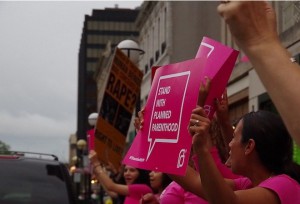. .DEMOCRATIC PARTICIPATION. .
An article by Aliyya Swaby, New Haven Independent (reprinted by permission)
The public schools “restorative justice” plan and the resettling of refugees in town strengthened New Haven’s “culture of peace” this past year, according to a new report.

Almost 200 “pink out” for Planned Parenthood (Photo by Lucy Gellman, New Haven Independent).
Compiled by the New Haven Peace Commission, the third annual report — “The State of the Culture of Peace in New Haven” — incorporates anonymous statements from 15 local activists on the ways that the city is improving or stagnating in eight different categories.
The conclusion: New Haven is moving toward peace. But slowly.
The report judges peace in New Haven by eight categories based on the United Nations Culture of Peace initiative launched in 1989. Each category was developed as a contrast to a characteristic of the culture of war: sustainable and equitable development, democratic participation, equality of women, tolerance and solidarity, disarmament and security, education for peace, free flow of information, and human rights.
Report author David Adams was at UNESCO until 2001, where he worked on the “Culture of Peace Programme” for promoting peace efforts nationwide. Nations, Adams said, operate under cultures of war, dominated by armament, propaganda, economic inequality and authoritarian control. But cities need cultures of peace to be successful.
“Cities don’t have enemies. Countries have enemies,” he said. “If we want to change the world and make peace, we should work at the level of the city and not at the level of the state.”
The full report can be read here.
The activists spoke anonymously, so that they spoke honestly, Adams said. “What you see is that it’s not perfect, but the city does work for the culture of peace.” The adoption of restorative justice in New Haven Public Schools, allowing kids to work through their problems instead of suspending them for disciplinary issues, is a major step forward in promoting peace, he said.
The Peace Commission is working to set up meetings with the chairs of Board of Alders education and youth committees in order to push for permanent funding for the restorative justice program. “Restorative justice addresses fundamental problems in the culture of peace. If we can do it in the schools, we can do it in society as a whole,” he said.
(Article continued in right column)
How can culture of peace be developed at the municipal level?
(Article continued from left column)
New Haven’s Integrated Refugee & Immigrant Services (IRIS) jumped into the national media in November for welcoming a family of Syrian refugees after the governor of Indiana refused to accept them into the state. This is an example of a “solidarity program” promoting community despite inequality in the city, according to the report.
The report also tracks programs that have not lived up to expectations from past years. Though the first peace report in 2013 lauded jobs program New Haven Works when it was first created to address unemployment and under-employment, this year’s report calls those early hopes “largely unfulfilled.”
New Haven Works has found jobs for 500 people in 18 months. That number is a “drop in the bucket,” the report quotes an activist saying.
Another major area of stagnation in creating a culture of peace in the city, according to Adams, is lack of sustainable, equitable development. Though thousands of new apartments are being developed, many are luxury units, “far beyond the reach of those who are being forced out of Church Street South, not to mention families and individuals already homeless or in over-crowded housing,” the report reads.
The prominence of women in politics this year—including Mayor Toni Harp’s reelection and Board of Alder President Tyisha Walker’s election by fellow alders—is a good model for woman’s equality, according to the report.
And New Haven supported Planned Parenthood at a rally on the Green against nationwide attacks attempting to cut sexual health services for women, the report says.
But women are largely heads of their households among the urban poor and often employed part-time or for low wages without benefits, the report said. Many have husbands or boyfriends in prison or who cannot find jobs because of a record.
The first report in 2013 said it was too early to judge whether community policing would be effective in New Haven. The new report characterizes it as still a work in progress.
“It takes a while to change the police force,” Adams said. “Developing trust takes years … Hopefully it will continue to move forward.” In other cities, the police are seen as an “occupying army, not as the fabric of the city.”
Earlier this week, the Peace Commission met to discuss the report and consider issues to address next year. Adams said it will continue pushing for a permanent restorative justice program and will need to come to consensus on another task.
A half dozen people sit on the commission. “The problem is when a lot of people think of peace, they think of business between countries. But when you talk about a culture of peace and define it this way, it becomes clear that it’s something people can do in their daily lives,” Adams said. “It brings peace home.”